
Pennsylvania’s looming childcare crisis – and how you can help
The importance of early childcare is obvious: Parents need safe environments for their kids while they are working.
But often overlooked is another crucial aspect.
“Care and quality and affordability are really critical, not only for the growth and development of the child, which is what many child advocates think about,” says Patrick Dowd, executive director of Allies for Children, a nonprofit child advocacy organization based in Pittsburgh.
“But this is fundamentally, first and foremost, an economic equity and economic development issue,” he says. “We can’t grow our economy and tap into the amazing resources of all adults if we don’t place their kids in safe and high-quality and affordable care.”
A recent report issued by the Center for American Progress predicts that the coronavirus outbreak may eliminate 4.5 million slots for childcare across the United States. Another survey by the Bipartisan Policy Center estimates that 60 percent of US childcare providers are now closed due to the pandemic, with those that remain open having reduced hours or limited slots available.
To ensure that childcare is funded in Pennsylvania, Start Strong PA, an initiative of Early Learning PA, organized an email campaign to advocate for childcare with state legislators. In the first six weeks of the campaign, nearly 1,700 advocates sent 4,100 messages, and childcare funding in the state was secured until the end of May, according to Cara Ciminillo, executive director of Trying Together, a regional nonprofit child advocacy group.
But more funding is needed to ensure childcare is available in June and the rest of 2020.
“When it comes down to it, there’s a small group of people who make the decisions about how we spend our state dollars,” Ciminillo says. “It’s a lack of priority, a lack of understanding about the way in which childcare is the backbone, the infrastructure of our economy. We absolutely have support from legislators on both sides of the aisle. … But there’s still some lack of understanding about the vital role it plays in our economy.”

As workers return to work once restrictions caused by the coronavirus outbreak are eased, the need for childcare will increase. Some parents may have to quit their jobs if they don’t have secure childcare available.
Even before the coronavirus outbreak, childcare was a “fragile system,” according to Dowd. The rigidity of rules and regulations and various funding mechanisms limited the supply of qualified childcare outlets.
“If you had wealth, you could afford childcare,” Dowd says. “If you were in extreme poverty, you might have access to childcare. If you were stuck in the middle, you probably had a real difficult time, and it was probably one of the biggest expenditures in your budget, and you were trying to make ends meet as best you could.”
Dowd thinks it is essential as we come through the pandemic to make sure funding for childcare is secure, especially because it’s not a niche issue. According to Ciminillo, 75 percent of children under the age of 5 in the 10 counties that comprise Southwestern Pennsylvania need childcare because their parents or caregivers work.
“In the same way that K-12 is rock solid and guaranteed and basically a right for all kids,” Dowd says, “so too should we see childcare for Allegheny County, Pennsylvania and the United States.”
Here’s how you can support the future of childcare:
1. Join Trying Together as an advocate by sending a message urging Pennsylvania lawmakers to authorize emergency funding to cover a portion of lost revenues for uncollected private pay child care tuition throughout the crisis period.
2. Sign on to Start Strong PA and support for increased access to and affordability of high-quality childcare programs, beginning with infants and toddlers.
3. Join the coalition of Early Learning PA to push for more substantial investments in high-quality early learning programs.
4. Get in touch with Pennsylvania lawmakers through Allies for Children’s step-by-step guide and make your opinion matter.
5. Be an influencer to your community by sharing the message from these childcare advocacy groups on social media. You could change the lives of kids across the state.


